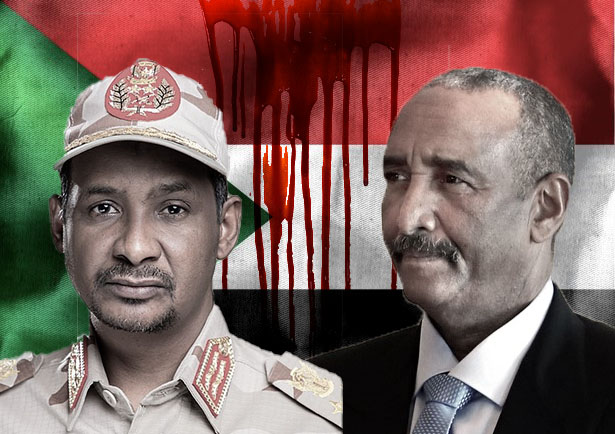An open clash within the Sudanese counterrevolution has plunged the country into violence, which has already killed around 100 people and wounded hundreds more. This long-anticipated battle to determine which clique of murderous gangsters gets to plunder Sudan is a tragic consequence of the failure of the masses to take power after the 2018-9 revolution.
Fighting erupted on Saturday between the Rapid Support Forces (RSF), a paramilitary group made up of barbarous Janjaweed militiamen at the command of General Mohamed Hamdan Dagalo (better known as Hemedti); and the regular Sudanese Armed Forces (SAF), under General Abdel Fattah al-Burhan, the de facto ruler of the country.
These are the two main figureheads of the Sudanese counterrevolution. The RSF have served as the frontline forces of reaction since the revolutionary overthrow of General Omar al-Bashir in 2018, having put down the 2019 mass sit-in in Khartoum in an orgy of bloodshed.
Burhan and Hemedti then cooperated in a coup against the civilian Prime Minister, the liberal Abdalla Hamdok in 2021, pushing aside the puppet transitional government, and effectively restoring military rule. The alliance with the liberals was always nothing but a cover for the rule of the counter-revolutionary generals.
The two generals have been jostling for authority since the coup, leaning on different imperialist powers in an attempt to shore up their positions. Both have participated in negotiations, overseen by the ‘Quad’ (the United States, the United Kingdom, the United Arab Emirates and Saudi Arabia), to transition to civilian rule.
These talks, which shamefully include the Forces of Freedom and Change (FFC) – a coalition of so-called pro-democracy organisations, founded during the revolution – are a total sham. The masses are under no illusions that the generals will give up their power, and any ‘civilian government’ organised with their blessing would be a fig leaf for military dictatorship.
Tensions have been growing in recent weeks between Burhan and Hemedti, who both have designs on ruling the country, and have continually delayed the signing of an agreed schedule for a new constitution and civilian elections.
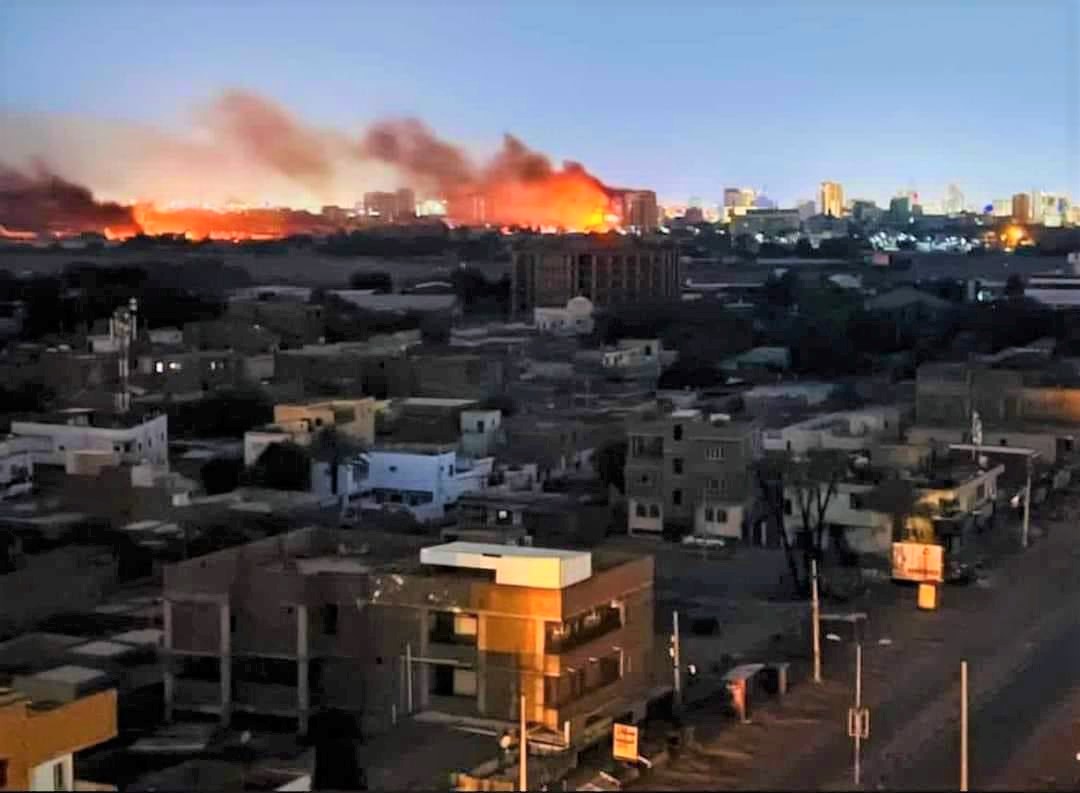 The RSF have served as the frontline forces of reaction since the revolutionary overthrow of General Omar al-Bashir in 2018, having put down the 2019 mass sit-in in Khartoum in an orgy of bloodshed / Image: Maram Al Awadi, Twitter
The RSF have served as the frontline forces of reaction since the revolutionary overthrow of General Omar al-Bashir in 2018, having put down the 2019 mass sit-in in Khartoum in an orgy of bloodshed / Image: Maram Al Awadi, Twitter
An impending clash was signalled by the SAF redeploying forces and building new high walls around the army headquarters in Khartoum, as well as setting up new security checkpoints in the capital and carrying out inspections of all travellers arriving in the airport.
A war of words also escalated between Burhan and Hemedti, with the latter saying the 2021 coup had “failed” and (incredibly) denouncing Burhan for opposing the transition to democracy – this from the man who commanded the forces that drowned the 2018-9 revolution in blood! Burhan for his part sought to create a Higher Army Council to remove Hemedti from his post as deputy leader of the ruling Sovereign Council.
In effect, these two gangsters were using the threat of violence to secure a stronger position for their respective cliques within the regime – participating in a charade of ‘negotiations’ for civilian rule, while hinting at their willingness to drag Sudan into further chaos. As Kholood Khair, a Khartoum-based analyst, explained to Middle East Eye:
“They allow their tensions to escalate, to increase their arms and their troops, in order to use the pressure of a possible confrontation to gain concessions from pro-democracy actors, particularly the FFC.”
Gangsters at war
Apparently, the concessions wrung out of the FFC quislings were not enough, and an excuse to settle accounts by force was provided by a planned integration of the RSF into the regular armed forces, as part of an agreement to be signed in April.
Things came to a head on Saturday, with the RSF claiming to have seized key locations in Khartoum such as the presidential palace, the army chief’s residence, the state television station, and the airport; as well as other sites in Omdurman, the western region of Darfur, and Merowe Airport in the north.
The SAF responded with ground troops, airstrikes and artillery, blasting RSF bases, many of which are based in and around built-up urban areas. A brief ceasefire agreed on Sunday to evacuate the wounded broke down almost immediately. Burhan has since made multiple, contradictory statements to disband the RSF, while inviting its members to join the regular military.
The so-called Peace and Security Council for the African Union has called for a meeting including South Sudan, Kenya, and Djibouti, but the airport in Khartoum has been a main point of fighting between the RSF and SAF, so it is unclear how delegates expect to enter the country.
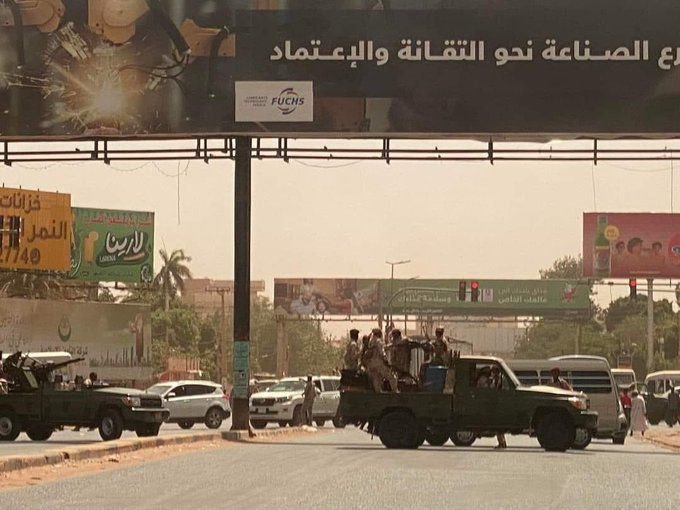 At the time of writing, it is very difficult to determine which side controls what territory / Image: Таино, Twitter
At the time of writing, it is very difficult to determine which side controls what territory / Image: Таино, Twitter
The previous spokesman for the RSF has issued a statement to announce that he had lost contact within the unit, and speaks only for himself when he says he is under the orders of the SAF. The SAF has also mentioned that the RSF’s Intelligence Command has joined its ranks.
At the time of writing, it is very difficult to determine which side controls what territory. What is clear is that civilians are being caught in the crossfire all around the country.
A warning from the SAF for people to “stay indoors” has provided scant protection, given the intensity of some of the fighting.
So far, air strikes have been reported in Khartoum, Bahri, Burri, Riyad and Omdurman; and gun battles have broken out in many other locations, including Karari, Port Sudan, and El’Obeid. The western regions, where most RSF militiamen are recruited, have also seen significant fighting, particularly in Darfur, Kordofan and the White Nile region.
People are trapped in homes, schools and hospitals, trying to avoid the clashes. There are widespread power and water outages across Khartoum, and many people are without access to food (during Ramadan, when most are already fasting) or medicine. There have also been reports of heavy looting of markets and homes, particularly by the RSF.
To make matters worse, after three World Food Programme (WFP) employees were killed during a battle at a Kabkabiya army base in North Darfur, the WFP suspended all operations in the country, cutting the Sudanese masses off from vital food aid.
Huda, a Khartoum resident interviewed by Reuters, explained the situation on the ground: "We're scared, we haven't slept for 24 hours because of the noise and the house shaking. We're worried about running out of water, food, and medicine for my diabetic father."
Imperialist cynicism
The imperialists have predictably shed crocodile tears at the latest breakdown of Sudan’s ‘transition to democracy.’ US secretary of state, Antony Blinken, called for an immediate ceasefire and a return to “talks that were very promising in putting Sudan on a path to a full transition to civilian-led government.”
“People in Sudan want the military back in the barracks, they want democracy, they want a civilian-led government.”
Of course, no such thing would ever emerge from backroom haggling with the same murderous army generals who have already slaughtered countless innocent people in their determined onslaught against the Sudanese Revolution in 2019 and since then against any hint of democratic rule.
The same nonsense was repeated by UK foreign secretary, James Cleverly, who said: “ultimately the immediate future lies in the hands of the generals who are engaged in this fight. We call on them to put peace first, to bring an end to the fighting, to get back to negotiations” [our emphasis].
Placing any hopes in the better nature of Burhan and Hemedti is the height of naivete, and from the mouths of the imperialists, it also reeks of cynicism.
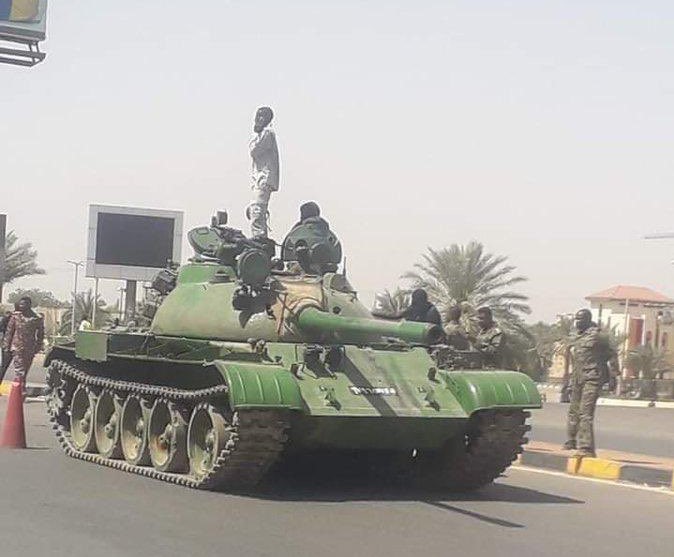 At every turn, the Sudanese Revolution has been betrayed by its leaders, who continually refused to support a final, armed confrontation between the masses and the ruling class / Image: Laura Walubengo, Twitter
At every turn, the Sudanese Revolution has been betrayed by its leaders, who continually refused to support a final, armed confrontation between the masses and the ruling class / Image: Laura Walubengo, Twitter
Western powers involved in the so-called transition to civilian rule have made no secret of their ulterior motives: maintaining a firm grip on Sudan, containing the revolutionary movement that began in 2018, and pushing back the influence of their geopolitical rivals.
In particular, the west fears Russia’s influence in the region. Both Hemedti and Burhan have sought closer ties with Putin, who has allegedly received huge sums of Sudanese gold in order to bolster the Russian war effort in Ukraine with funds that circumvent western sanctions.
The Wagner mercenary group are reportedly present in Sudan and have provided training and equipment to the military. Moreover, the Sudanese generals have signalled their willingness to let Russia build a naval base on the Red Sea.
US imperialism is eager to curb these ties between Sudan and the Kremlin, and it has no qualms about working with counterrevolutionary mass murderers in the process. An article in National Interest puts the matter bluntly:
“The stakes are indeed high for U.S. interests. As such, the United States must work with the Sudanese leaders who backed the Framework Agreement to create an incentive structure for Sudan’s elites to implement the agreement and pursue a pro-American course for the country…
“While military actors in Sudan and throughout the region have poor human rights and governance records, it is critical that the United States recognize when these actors align with pro-American policies and that Washington increase cooperation with them when they do.”
For their part, Saudi Arabia, the UAE and Egypt have also leaned on one murderous clique or another in order to extend their influence and make claims on Sudan’s resources, especially its agricultural wealth, gold mines and ports.
The El-Sisi regime in Cairo in particular has consistently backed Burhan’s efforts to crush the Sudanese masses, as it fears that a revolutionary wave in a neighbouring country could revive the struggle of the Egyptian masses against their own military dictator.
In short, Sudan lies at the centre of a thieves’ kitchen of predatory imperialists, who sing a siren song of ‘civilian rule’ and ‘democracy’, while at the same time negotiating with the counterrevolutionary generals to carve up the country for their own ends.
One thing they all have in common is a shared interest in ‘stability’. Of course the stability that they talk of is on the basis of preserving the capitalist system and preventing the revolutionary struggle of the masses which could provoke a wave of insurrection in the region. It is primarily for this reason that they cooperate with gangsters like Burhan and Hemedti.
Betrayals by the leadership
At every turn, the Sudanese Revolution has been betrayed by its leaders, who continually refused to support a final, armed confrontation between the masses and the ruling class. Instead they opted for securing a deal with the capitalist gangsters.
The most treacherous elements, like the FFC, have entered into direct negotiation with the counterrevolution, destroying their credibility in the eyes of the masses and paving the way for a bloody defeat of the movement.
The Sudanese Professionals Association (SPA), which played a positive role in the early days of the revolution, has also massively degenerated. The body released a statement on 15 April that affirmed support for the “framework political agreement” to establish civilian rule, stitched up in talks with the generals:
“The framework agreement, and the final stage reaching the final agreement and the transitional constitution, are an objective and acceptable basis for the restoration of the democratic transition and civil transformation, and we emphasise in the gathering of Sudanese professionals our commitment to this.”
It further called on “the leaders of the armed forces, RSF, police and public intelligence to carry out their national duty to protect internal and national security.”
To sow illusions in this litany of killers to defend “security” and the “democratic transition” is a blatant betrayal of the masses, who have shed their blood for years fighting these monsters.
Meanwhile, the Sudanese Communist Party released a statement that seemingly takes the side of Burhan and the SAF over the RSF! It calls for “quickly dissolving all militias, collecting weapons spread throughout the cities and rural areas, and reconstituting the unified national professional army” [our emphasis]!
This is an absolutely abhorrent position (shared approvingly by the so-called Communist Party of Britain) that is tantamount to legitimising one wing of the counter-revolution over the other, and consolidating all arms and state power under Burhan and the SAF.
Ironically, these same characters were silent in 2019, when the need of the hour was the arming of the masses and the call for the soldiers to join the revolution against the generals.
The statement further calls for: “the unity of our people, all national forces, radical change forces and resistance committees around the goals of the revolution, restoring peace, security and stability.”
What national forces are we talking about? Do they include any of the regular army brass? The parasitic Sudanese bourgeois? These ‘forces’ are directly opposed to the revolution. This is a call for unity (to paraphrase PFLP leader Ghassan Kanafani) between the sword and the neck.
Even the most consistent and courageous elements at the head of the revolution, such as the Neighbourhood Resistance Committees, are repeating all their old errors.
A statement by Resistance Committees Coordination in Khartoum repeatedly emphasised the masses’ “peaceful battle” against the generals, asserting: “We started with peacefulness and will continue with it to achieve our goals against all parties of the ongoing war in the country's streets.”
The statement goes on to say that masses must “raise the slogan of ‘No To War’ and not respond to any calls for arming [the people], as they will lead us to civil war. The only loser from war is the people, so let's unite to overcome it.”
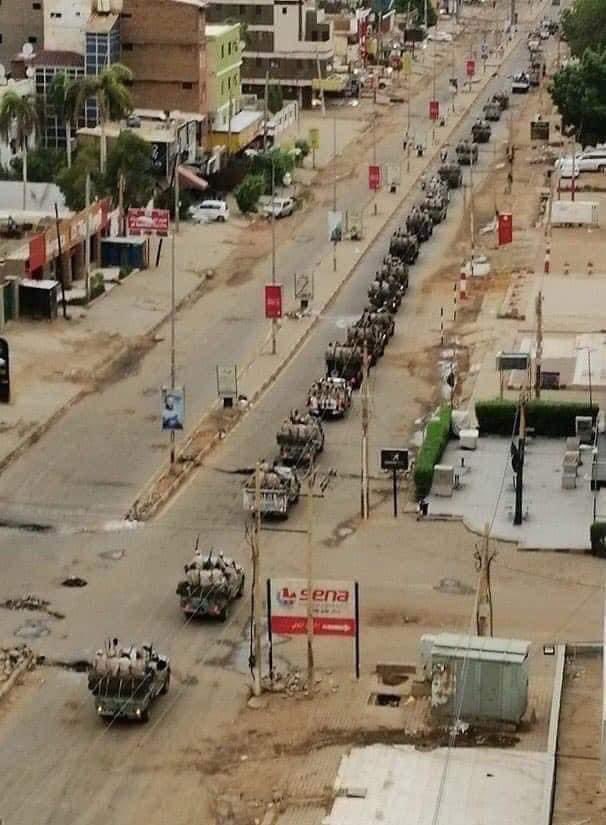 The current state of affairs in Sudan could only have been averted through a victory of the Sudanese Revolution / Image: Zagazola, Twitter
The current state of affairs in Sudan could only have been averted through a victory of the Sudanese Revolution / Image: Zagazola, Twitter
Yet again we see the bankrupt pacifism of the Resistance Committees Coordination. The spectre of civil war has been used time and again by leading layers to justify their refusal to arm the masses for a final reckoning with the generals.
As a result, the people have been the victims of a one-sided war at the hands of the counter-revolution, which now risks dragging Sudan into a civil war between competing cliques of butchers, both of which are mortal enemies of the workers and the poor.
Tragedy and the tasks ahead
The current state of affairs in Sudan could only have been averted through a victory of the Sudanese Revolution. In a word, it would have meant prosecuting an unrelenting class war against the counterrevolution.
There were many opportunities to arm and prepare the people for a decisive insurrection against the reactionary generals, and take power into their hands. All were scuppered by the vacillating leadership, which refused to do what was necessary.
Once in control, the people of Sudan would not only have won democratic rule but laid the basis for carrying out sweeping reforms to every area of life: from healthcare, to education, to infrastructure and so on, funded by expropriating the ill-gotten wealth of Sudan’s rotten elite, and repudiating the country’s imperialist debt.
The path would have been open for the socialist transformation of society, the only road to a decent and dignified existence for the people of the country. Any party, even on a modest scale, with such a programme could have played a decisive role in these events. Sadly, no such party exists.
No matter who emerges on top in this internecine struggle within the counterrevolution, nothing will improve for the Sudanese masses. As one Sudanese woman put it, quoted on social media:
“They [RSF & SAF] are struggling over seats. The rest of us are struggling over food and water. They’re struggling over power, over robbing the people… while the rest of the country struggles over food, water, education and healthcare.”
And at this moment, the masses are paying a terrible price for the failure of their leaders. But despite immense levels of exhaustion and demoralisation, the people have continued to march and struggle up until this very day.
There can be no trust placed in the ‘international community’ to resolve this new outbreak of violence, which the imperialists helped bring about. The only way out of this nightmare will come on the basis of a rejuvenation of the Sudanese Revolution, which must learn the lessons of past defeats, defend itself against all the forces of reaction through its own bodies of struggle, and dispense with any elements holding it back.

